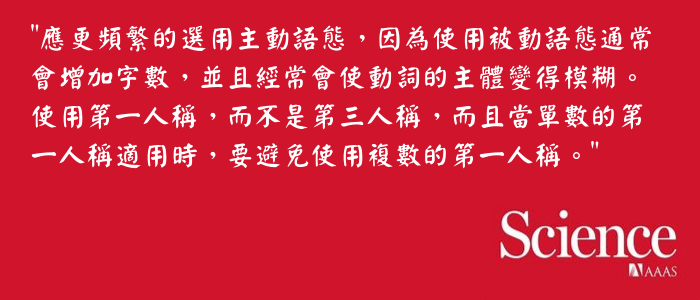




Quick Takeaways:
The English language has a rich history of borrowing words from other languages, especially from Latin. Latin abbreviations such as ‘a.m.’, ‘p.m.’ and ‘CV’ have become part of our everyday vocabulary. Such abbreviations are also frequently used in academic writing, from the ‘Ph.D.’ in the affiliation section to the ‘i.e.’, ‘e.g.’, ‘et al.’, and ‘QED’ in the rest of the paper.
This guide explains when and how to correctly use ‘et al.’ in a research paper.
在亞洲地區學習英語的學生都會普遍認為在文章中多使用被動語態 (passive voice)是比較專業,因為其表達方式看似較複雜和客觀,因此他們都希望透過多用被動語態以突顯他們的英語能力。甚至乎學校的英文老師都經常在批閱學生寫作時給予那些多使用被動語態的學生較高分數。
但是,其實在學術研究領域內,對於論文應以被動還是主動語態 (active voice) 書寫都還是有一些爭議存在。
雖然被動語態一度被認為是比較能夠客觀陳述,但是現在大部分學術期刊都更偏好以第一人稱書寫。
可參考以下由兩份享負盛名的學術期刊所提供的意見:


因此,箇中的關鍵要點就是:
在上一篇博文中,我們已經討論過論文引言的結構及鋪排,而我們亦認識到引言的其中一個重要作用是提供讀者該研究的基本資料及內容。
因此,你在引言部分有機會需要經常穿插引用一些參考研究和你自己的研究的資料,所以能夠清楚交代你到底是在引述那一個研究就變得非常重要,而使用主動語態可以更有效避免含糊不清的情況發生。
這是一些小提示:
但切記語言運用在不同學科中都會有些許變化,所以要查閱你將要投稿的期刊的其他已發表論文是如何撰寫的,因為以你的論文所在的學科的一貫語言運用風格去寫你的論文是最為重要的。
Wondering why some abbreviations such as ‘et al.’ and ‘e.g.’ use periods, whereas others such as CV and AD don’t? Periods are typically used if the abbreviations include lowercase or mixed-case letters. They’re usually not used with abbreviations containing only uppercase letters.
Our latest online workshop built on the success of face-to-face workshops we developed specifically for local universities. Over 30 faculty members joined the session, presented by our Chief Operating Officer, Mr Nick Case, to learn from our case studies on editing research proposals.
The response to our workshop, which included a constructive and insightful Q&A session, was very positive.Drawing on our extensive experience working with hundreds of Hong Kong researchers targeting the GRF and ECS every year, we used examples of poor and subsequently improved proposals to show the attendees how they can make their applications stand out. The response to our workshop, which included a constructive and insightful Q&A session, was very positive.Drawing on our extensive experience working with hundreds of Hong Kong researchers targeting the GRF and ECS every year, we used examples of poor and subsequently improved proposals to show the attendees how they can make their applications stand out. The response to our workshop, which included a constructive and insightful Q&A session, was very positive.Drawing on our extensive experience working with hundreds of Hong Kong researchers targeting the GRF and ECS every year, we used examples of poor and subsequently improved proposals to show the attendees how they can make their applications stand out.

Wondering why some abbreviations such as ‘et al.’ and ‘e.g.’ use periods, whereas others such as CV and AD don’t? Periods are typically used if the abbreviations include lowercase or mixed-case letters. They’re usually not used with abbreviations containing only uppercase letters.
Check out AsiaEdit’s professional research grant proposal editing service.
Read more about our training services covering all aspects of academic writing tailored for local institutions.
More resources on research grant proposal writing: On-demand Webinars
Preparing an effective research proposal – Your guide to successful funding application
Preparing an effective research proposal – Your guide to successful funding application (Part 2)

Rachel於2001年剛在 University of Exeter 取得博士學位的同時以自由編輯的身份首次加入我們。在擔任博士後研究人員數年之後,她專注於大學教授心理學,並於2010年回到AsiaEdit,並專注於學術編輯專業。她於2018年升任助理總編輯,並於2020年繼而成為我們的聯合主編。由於無法完全離開學術界,她還在意大利的一所英語大學教授心理學。
您的日程安排,我們最關切 AsiaEdit 採用個性化的編修方法。
香港灣仔軒尼斯道99號
彰顯大廈 2101室
上午 9:00 至下午 6:00
(+852) 2590 6588
